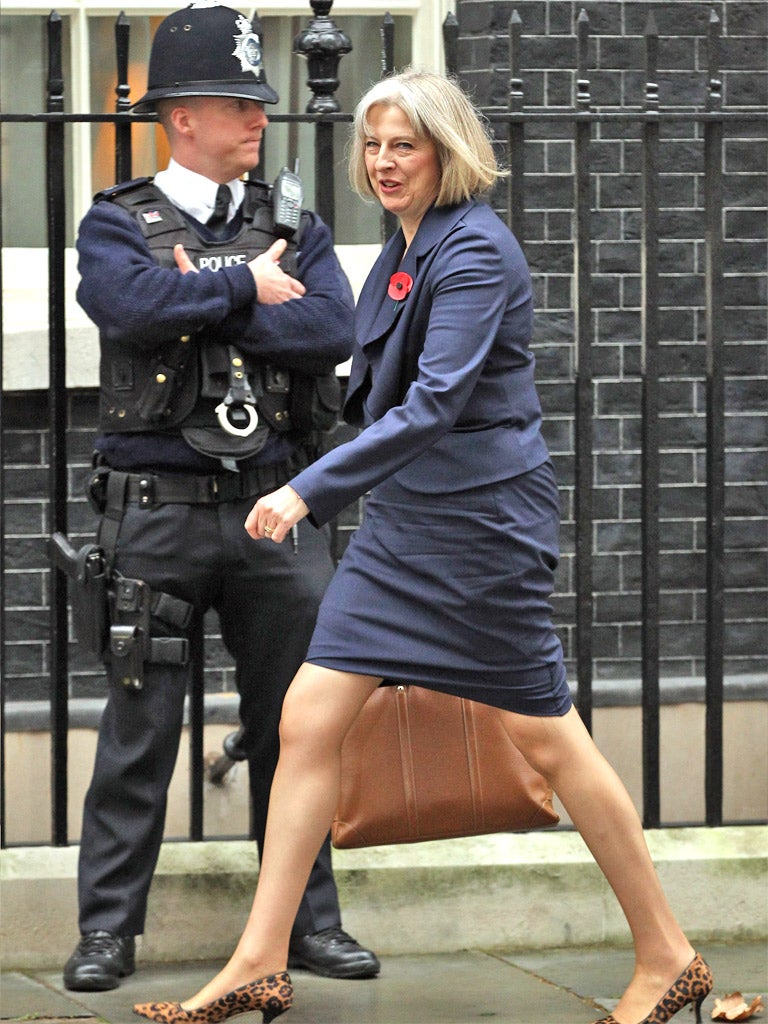Pressure grows on May as head of UK borders quits
Home Secretary accused of misleading Parliament over her claims she didn't approve scrapping of key immigration checks as she insists relaxing of key immigration checks were not approved

Your support helps us to tell the story
From reproductive rights to climate change to Big Tech, The Independent is on the ground when the story is developing. Whether it's investigating the financials of Elon Musk's pro-Trump PAC or producing our latest documentary, 'The A Word', which shines a light on the American women fighting for reproductive rights, we know how important it is to parse out the facts from the messaging.
At such a critical moment in US history, we need reporters on the ground. Your donation allows us to keep sending journalists to speak to both sides of the story.
The Independent is trusted by Americans across the entire political spectrum. And unlike many other quality news outlets, we choose not to lock Americans out of our reporting and analysis with paywalls. We believe quality journalism should be available to everyone, paid for by those who can afford it.
Your support makes all the difference.Theresa May faced mounting pressure last night after the head of the UK Border Force resigned and promised to tell the whole story behind the relaxation of Britain's borders.
Brodie Clark launched a scathing attack on the Home Secretary, promising to lodge a claim for constructive dismissal and citing "wrong" comments made by her to Parliament and the behaviour of the Home Office in blaming him for the reduction in passport checks for non-EU nationals at Britain's airports over the summer.
His sudden resignation means that he will be free to give his version of events when he appears before the Home Affairs Select Committee – testimony that is sure to raise many more questions for Mrs May to answer.
Mrs May is sticking to her guns and her allies say the Whitehall paper trail will confirm her version of events. But if Mr Clark provides convincing evidence that she misled MPs, she would come under enormous pressure to resign. David Cameron would not want to lose another senior Cabinet minister only three weeks after the resignation of Liam Fox as Defence Secretary.
In a statement released last night, Mr Clark rejected Ms May's suggestion that he scrapped key checks without ministerial approval.
"The Home Secretary suggests that I added additional measures, improperly, to the trial of our risk-based controls. I did not," he said.
"The Home Secretary also implies that I relaxed the controls in favour of queue management. I did not. Despite pressure to reduce queues, including from ministers, I can never be accused of compromising security for convenience."
Adding that he was sad to end his career in such fashion "after 40 years of dedicated service", Mr Clark said: "My employer has disregarded my right to reply in favour of political convenience."
Earlier, the Home Secretary told MPs that Mr Clark, who was suspended from his post over the weekend, had gone further in relaxing border checks than she had been prepared to accept.
Giving evidence to the Home Affairs Committee yesterday, Ms May said there was no question of her resigning, claiming that the original remit of the pilot scheme related only to individuals holding EU passports. She said: "I take full responsibility for my decisions and actions related to the pilot, but Brodie Clark must take responsibility for his actions."
Mrs May told MPs that Mr Clark had wanted more discretionary controls than she was prepared to sign off. But when she rejected these and brought in a more limited pilot scheme during the peak summer period, Mr Clark went further, scrapping key checks against a Home Office database without receiving the authorisation of a minister. The number of suspected terrorists, criminals and illegal immigrants who entered the country as a result of the move will never be known, Mrs May admitted. Labour accused Mrs May of giving the "green light" to the policy, pointing to UK Border Agency (UKBA) guidance for border force staff.
The memo, dated 28 July 2011, stated: "If, for whatever reason, it is considered necessary to take further measures, beyond those listed above, local managers must escalate to the border force duty director to seek authority for their proposed action."
But Mrs May said the guidance "does not allow a decision to be made to significantly change the checks at the border" and was simply part of health and safety measures, should people start becoming ill or fainting in long queues at ports.
E-petition passes 100,000
MPs are set to debate proposals to limit immigration after a Downing Street "e-petition" calling for greater restrictions of the number of people allowed to enter Britain was signed by over 100,000 people in less than a week.
Because it has passed the 100,000 mark, MPs must now consider holding a full debate on the petition's call for drastic measures to stop the UK population from reaching 70 million. Last night the Backbench Business Committee indicated it would look at holding the debate in the New Year. The motion was launched by the pressure group Migrationwatch and highlighted by the Daily Mail. At one stage, the e-petition was being signed by one person every three seconds.
The 'e-petition' initiative was launched by David Cameron in an attempt to reconnect politicians with the public.
Oliver Wright
Join our commenting forum
Join thought-provoking conversations, follow other Independent readers and see their replies
Comments